World’s happiest country? That’s easy. Finland has won that title for eight straight years.
But what about world’s happiest CEO? You might nominate Amazon’s Jeff Bezos, who’s probably still in his Sanchez honeymoon phase and just filed to sell $1.5B more in shares.
But we’ll venture another candidate: Nvidia’s Jensen Huang. And it’s not just because of his congenial grin and trademark leather jacket. Rather, it’s three reasons…
Stay on top of your world from inside your inbox.
Subscribe for free today and receive way much more insights.
Trusted by 145,000+ subscribers
No spam. No noise. Unsubscribe any time.
- He’s got the world’s most valuable company
You’ll have heard his AI chip pioneer just became the world’s first listed firm to break the $4T mark, but it’s worth a quick look at the trajectory — it’s up…
- 80% since April
- 250% since early last year, and
- 1,000% since early 2023 (the year it first cracked $1T).
That run has driven Huang’s own net worth beyond $143B, overtaking Warren Buffett. But what’s behind this run? Beyond “ermahgerd, Er Er” (translation: ‘OMG, AI’), it’s also…
- He can sell chips to China again
China has long been a critical Nvidia market, accounting for ~13% ($17B) of all revenues last year. And that’s remarkable when you recall the Biden administration was actually tightening chip exports to China to avoid helping the People’s Liberation Army.
Huang managed to thread that needle in a novel way: via the purpose-built H20 chip from late 2023, which went on to become China’s go-to AI chip throughout 2024. It was ✌️purpose-built✌️ in the sense it was deliberately slower, to duck under the tighter US rules.
But when Trump 2.0 revoked Huang’s H20 license for China earlier this year, things looked grim: the CEO had to declare a $5.5B write-down in April, and his share price bottomed out. So one reason why Nvidia’s share price is soaring again this week is this: according to a company blog post, Nvidia now has the green light to resume H20 sales to China.
Which gets us to how Huang pulled this off…
- He’s wining and dining the right people
Huang’s strategy has targeted not just the Trump administration and US lawmakers, but also the broader public via some big media interviews.
And his arguments have been consistent, claiming that selling H20s to China maintains:
- a) America’s tech advantage by keeping China dependent on US tech
- b) America’s economic advantage by keeping that revenue pipeline for the US rather than rivals like China’s own Huawei, and collectively thereby…
- c) America’s security advantage, with any risk of tech leakage to the People’s Liberation Army (PLA) still manageable.
He basically makes that last point by arguing that the PLA doesn’t even want American-made chips in its systems because that’d be a security risk. And even if the PLA got its hands on H20s, the tech’s self-imposed speed limits make the risk tolerable.
But yep, it’s that same “China doesn’t want them” argument that might be the most intriguing, because a US thinktank actually combed through 66,000 of the PLA’s purchase records (pre-H20) and found the PLA was absolutely frothing for advanced Nvidia chips. And even once Biden’s chip controls kicked in and the H20 became popular, there were still reports last year of users in China getting hold of ultra-advanced A100 chips.
Anyway, it seems Trump 2.0 has concluded the pros outweigh the cons. And Huang’s customers in China seem comfortable too: he was there within days of Trump’s initial ban, and is due back for government meetings to share the good news this week.
Intrigue’s Take
There’s long been focus on how China’s Xi Jinping has weighed up his competing economic and security priorities. And the spate of crackdowns have made clear: he wants a thriving private sector, but only so long as it’s still answerable to the Party. We wrote recently about the clear symbolism in the president’s decision to host China’s top CEOs, but at a gathering presided by the Party’s chief propagandist, Wang Huning.
So maybe the most interesting story about this latest Nvidia story is what it reveals about how President Trump is balancing those same competing priorities for the US: his initial move to block Nvidia’s H20 pipeline to China suggested he was leaning more towards security. And his subsequent H20 reversal suggests maybe he’s rebalancing back towards business — perhaps that’s because Nvidia successfully argued that pro-business is pro-security. Or maybe Nvidia has pledged something else helpful to US security.
Whatever’s going on, Nvidia’s CEO has figured out how to have his chips and eat them too, hence our formal nomination for the title of the world’s happiest CEO.




